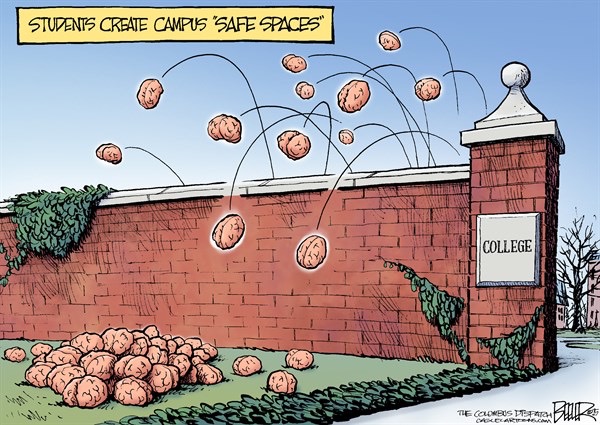Penna Dexter
There’s a restrictive atmosphere that’s taken hold at colleges and universities across the nation. We have to ask, what happened to these institutions’ longstanding claims to provide environments for the open exchange of ideas?
Increasingly, in response to protests and demands by students, only certain —mostly left-leaning — perspectives on things are allowed. Speakers are invited and then disinvited or shouted down when it becomes apparent their conservative positions will offend a segment of the student body. Reading material is banned because some students say it makes them uncomfortable. Apologies for expressing certain — mostly moral or conservative — views are demanded and received. Universities now routinely offer trigger warnings and safe spaces.
A trigger warning is when the professor has to tell students in advance that they are about to be taught something they might find offensive or that might upset them psychologically.Safe spaces at colleges are sort of refuges from ideas that might make students feel they are not OK because of things like their sexual orientation or lifestyle choice.
One prestigious school has announced it will have none of this stuff. John Ellison is Dean of Students at the University of Chicago. He wrote a welcome letter to incoming students in which he clearly described the University’s “commitment to freedom of inquiry and expression.” He said: “Our commitment to academic freedom means that we do not support so-called ‘trigger warnings,’ we do not cancel invited speakers because their topics might prove controversial, and we do not condone the creation of intellectual ‘safe spaces’ where individuals can retreat from ideas and perspectives at odds with their own.”
Dean Ellison also wrote that, “Members of our community are encouraged to write, listen, challenge, and learn, without fear of censorship.” How refreshing. This type of atmosphere might cause some students discomfort, but they will learn.
Debating ideas can cause discomfort because to do it you have to do the hard work of figuring out how to explain and argue for what you believe and why. Students may not realize this but underneath this demand for safe spaces and trigger warnings is a sort of mental laziness, the desire to be free of the hard work of deciding among other views. What the University Chicago wants is questioning and open debate.
The University of Chicago’s president, Robert Zimmer clearly articulated the school’s philosophy in a recent editorial in the Wall Street Journal, writing that, “Free speech is at risk at the very institution where it should be assured: the university.”
The University of Chicago is bucking that trend. This should not reassure parents that the traditional moral values, Christian beliefs, or politically conservative ideas their kids hold will not be challenged there. For that, you need a Christian college or a conservative one, like Hillsdale.
The University of Chicago is not fostering political correctness, but true intellectual diversity.
Let’s hope lots of other universities move in this direction.
 Listen Online
Listen Online Watch Online
Watch Online Find a Station in Your Area
Find a Station in Your Area









 Listen Now
Listen Now Watch Online
Watch Online
